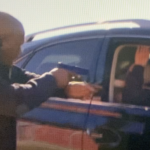Surviving a Police Encounter – Part 1 of Communication, Caring, Compliance
Surviving a Police Encounter
Part 1: Caring, Communication, and Compliance
 Stories about police brutality hit the headlines weekly these days. Stan Campbell, a 20-year veteran of law enforcement and founder of D.O.P.E. the Movement, says he believes that the number of incidents is not on the rise, but thanks to the proliferation of body cameras and smartphones, the public is more aware of violent law enforcement encounters when they occur. Scenes of police brutality are populating our social media feeds and being broadcast into our living rooms. Stan knows better than most that there is a trust gap between law enforcement officers and many of the communities they serve. Growing up in a depressed neighborhood in Newark, New Jersey, Stan initially developed a negative view of police. “I didn’t run into a lot of nice ones,” he says. As a young man, however, Stan joined the Oklahoma City Police Department hoping to make a positive change from the inside, and he became one of the “nice ones.” He also learned what a law enforcement encounter felt like from the officer’s point of view.
Stories about police brutality hit the headlines weekly these days. Stan Campbell, a 20-year veteran of law enforcement and founder of D.O.P.E. the Movement, says he believes that the number of incidents is not on the rise, but thanks to the proliferation of body cameras and smartphones, the public is more aware of violent law enforcement encounters when they occur. Scenes of police brutality are populating our social media feeds and being broadcast into our living rooms. Stan knows better than most that there is a trust gap between law enforcement officers and many of the communities they serve. Growing up in a depressed neighborhood in Newark, New Jersey, Stan initially developed a negative view of police. “I didn’t run into a lot of nice ones,” he says. As a young man, however, Stan joined the Oklahoma City Police Department hoping to make a positive change from the inside, and he became one of the “nice ones.” He also learned what a law enforcement encounter felt like from the officer’s point of view.
“Even a routine traffic stop can create anxiety for both parties,” Stan says. “The officer doesn’t know who they are about to encounter, and the civilian doesn’t know how they’ll be treated by the officer.”
“I’m afraid of you, and you’re afraid of me. Too often, we start the encounter with conflict, and conflict is derived from fear,” Stan says. “So when we meet each other, the first look — it doesn’t even take a word — the first look determines how things are going to go. The first word spoken adds to that. And then ego comes in a pushes people beyond the place they should have gone.” Many times, such an encounter escalates into violence.
D.O.P.E. stands for De-escalating Officer Patrol Encounters; it’s an organization Stan founded with the goal of defusing situations like the one just described by helping law officers and civilians alike understand how to bring down the tension during an encounter. Because officers are in a position of authority, Stans admits that law enforcement has the biggest responsibility in de-escalating encounters, but he stresses that civilians often contribute to the circumstances that lead to violence.
“When you look at the numbers and say, ‘We’re the victims. How dare you say that we’re responsible for this.’ I understand where you’re coming from,” Stan says. “I’m not saying you’re responsible for the end result, but if something that you do escalates the situation, it makes you culpable.” Attorney Lorenzo Banks agrees. Lorenzo is a criminal defense attorney and civil rights attorney in Oklahoma City, and he’s part of D.O.P.E. the Movement. “I represent the people,” Lorenzo says, “and as much as I fight really, really hard for these people against police officers who do some horrible things, I also recognize that people make serious mistakes throughout the course of police stops.”
While both Stan and Lorenzo agree that the onus of reducing police brutality is on law enforcement agencies, they also both agree that there are things civilians can do on their own to lower the tension during an encounter with an officer and to ensure they survive with their rights intact. With this in mind, Stan has introduced “The Three Cs” of surviving an encounter with law enforcement: Caring, Communication, and Compliance. “Caring” means that if a civilian enters a police encounter with concern for the officer, for their safety, the interaction will begin on a positive note. This means making your hands visible during the stop. It means not making sudden movements. Stan says, “If you make the encounter safe for the officer, the encounter should be safer for you.”
“Communication” means speaking to the officer clearly and calmly. Stan expresses the importance of preparing for communication by rolling down all windows and turning music off. Stan also teaches it is critical upon first contact to listen for orders given by the officer. As a criminal defense attorney, Lorenzo stresses that you don’t have to answer an officer’s questions, but he says “there is a respectful way to assert your rights.”
“Compliance” means obeying the lawful orders of a law enforcement officer. Lorenzo says that police have the right to ask drivers and passengers to get out of a vehicle during a traffic stop, and they are legally allowed to detain people for a number of reasons. Even if you feel an officer is violating your rights, it’s best to state your position, but not resist. “You can’t file a complaint if you’re dead,” Stan says. While police have the ultimate responsibility to de-escalate tensions during an encounter, citizens have the ability to behave in a manner that reduces the chances that an encounter will end in violence.
“The Three Cs” don’t require citizens to abandon their rights to the mercy of a police officer’s authority, rather they offer citizens a way to cooperate while surviving the encounter and preserving their rights for the future. Lorenzo says, “Make sure you’re blameless, and that starts with learning the law and governing yourself accordingly. No matter what the opposite side does, you follow the law so that in the event that something does happen and we need to sue, you don’t look like someone who helped justify what the officer did.”
In the coming weeks, we’ll explore each of “The Three C’s” in more detail, and give you more tips on how to survive a police encounter with your rights intact.
 SHAWN VINCENT – LITIGATION CONSULTANT
SHAWN VINCENT – LITIGATION CONSULTANT
Shawn Vincent is a litigation consultant who helps select
juries in self-defense cases, and he manages public interest
of high-profile legal matters. If you have any questions for
Shawn, or would like topic specific articles, please send your
request to dopethemovementinfo@gmail.com attention Shawn Vincent Articles.
Leave a Comment
You must be logged in to post a comment.


